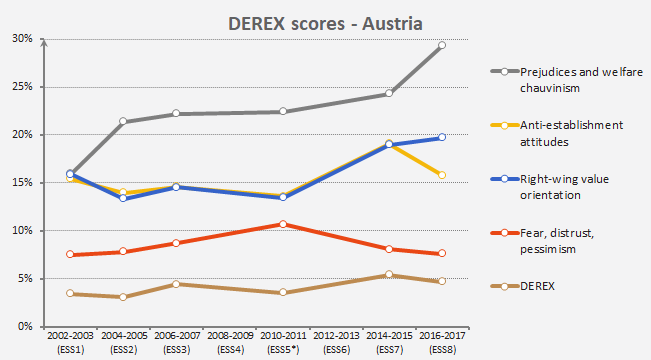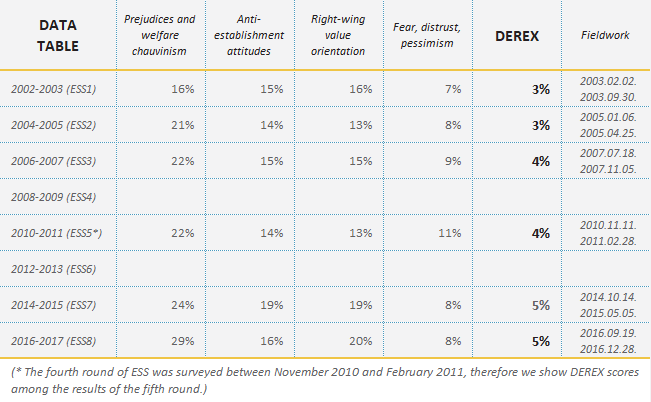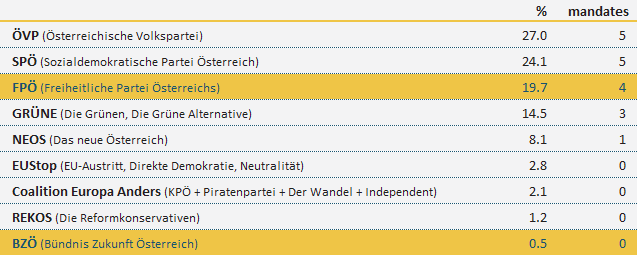Austria
Factsheet
| ETHNIC MINORITIES: | |
|
Muslim: Roma: |
5.7% 0.3% |
| RELIGIONS: | |
|
Roman Catholic: Protestant: Muslim: |
73.6% 4.7% 4.2% |
| NET MIGRATION: | 150,000 |
| POP. GROWTH RATE: | +0.5% |
| GDP GROWTH: | +0.9% |
| GDP PER CAPITA: | 46,642 |
| UNEMPLOYMENT: | 4.3% |


Austrian Freedom Party (Freiheitliche Partei Österreichs, FPÖ)

The Austrian Freedom Party (Freiheitliche Partei Österreichs, FPÖ) was founded in 1956, but rose to prominence only in the 1980s when it formed a coalition government with the Social Democratic Party of Austria (Sozialdemokratische Partei Österreichs, SPÖ). The peak of its political success was in 1999, when it won 27% of the national vote and entered a coalition government with the Austrian People’s Party (Österreichische Volkspartei - ÖVP). The FPÖ’s disastrous performance was largely the result of a backlash from other European nations, which imposed sanctions on Austria because of FPÖ’s radical anti-EU and anti-multicultural agenda.
The FPÖ’s economic policies tend to be libertarian, favoring lower taxes and privatization, and advocating less government intervention in the economy. It emphasizes citizen control over the government by encouraging referenda and the direct election of the president. The FPÖ warns against rising Islamization (‘Austria First’ was an FPÖ slogan), demands strong limits on immigration and promotes the preservation of Austrian culture. The party is often criticized for its pro-Russian stance and Russian connections, such as signing a ‘partnership treaty’ with Vladimir Putin’s United Russia party, campaigning against EU sanctions and supporting Crimea’s annexation by Russia.
In the 2013 general elections, the FPÖ managed to hold on to its third position in the political race and, in fact, compared to 2008, it managed to significantly increase its support base from 11% to 17.5%. In the 2014 European Parliamentary election campaign, the party addressed migration and issues related to sovereignty, such as the reintroduction of border controls under national competence. The party came in third place, with 12.71% of the vote, winning 2 seats in the European Parliament (EP). Today, the party is part of the Europe of Nations and Freedoms Group in the EP.
In the presidential election on May 22, 2016, Norbert Hofer, the FPÖ candidate, lost by a mere 30,863 votes to former Greens Party leader, Alexander Van der Bellen. FPÖ successfully challenged the election on the grounds that regulations for handling postal ballots were not abided to. The Court’s ruling is unprecedented, as no other European democracy has ever repeated an election as a result of a national court decision. The new presidential election was planned to take place on 2nd of October, but was postponed to 4th of December. Between the two elections, Hofer softened his anti-EU stance, openly stating that he does not want Austria to leave the EU. Van der Bellen increased his lead by winning with a 7.6% margin and was sworn in as president in January, 2017.
In the Spring of 2017, due to the collapse of the governing coalition, the Austrian Parliament decided to hold snap legislative elections in October of 2017, a year before the scheduled date. The FPÖ polled as the most popular party for a long period of time before the election. However, the conservative ÖVP party managed to gain support by choosing Sebastian Kurz, a young and charismatic politician as their new leader and candidate for chancellor and by adopting a hardline anti-immigration stance. In this way, ÖVP succeeded in gaining votes from the far-right and won the election with 31.5% of the vote. The Social Democratic Party (SPÖ) received 26.9% and FPÖ came as third with 26%. After the election, following expectations, the ÖVP and the FPÖ started negotiations to form a coalition government. They hope to reach a deal before the end of 2017.
(Last update on 7 December, 2017)
FPÖ on the Internet:
Sources:
- Jamie Bartlett et al.: “The New Face of Digital Populism.” Demos: London 2011, p. 103-104. Available online at http://www.demos.co.uk/files/Demos_OSIPOP_Book-web_03.pdf?1320601634
- Political Capital

Alliance for the Future of Austria (Bündnis Zukunft Österreich, BZÖ)

The Alliance for the Future of Austria party (Das Bündnis Zukunft Österreich - BZÖ) was formed in 2005 due to internal tensions between the more radical activist members within the FPÖ and leader Joerg Haider, during the FPÖ- ÖVP coalition. The situation resulted in Haider and the majority of MPs and cabinet members splitting from FPÖ to create BZÖ. The creation of BZÖ signaled the differences between the longtime leadership of Haider and the supporter base. Haider looked to separate BZÖ from the overly radical far-right FPÖ, making the relationship between Haider and Strache, FPÖ’s leader, tense. Haider’s untimely death in a car accident in 2008 forced the party into a sudden period of transition, having to find a new leader. BZÖ is often perceived as a phenomenon of Carinthia, Haider’s original headquarters where he was governor on two occasions. Following Haider’s death, the new BZÖ leadership sought to form a platform that combined social conservatism with liberal economics. Haider’s eventual successor, Josef Busch, had been struggling to fill Haider’s shoes and thus stepped down following the 2013 Parliamentary election. Gerald Grosz acted as leader between the years of 2013 and 2015 and since then, the leader of the party is Johanna Trodt-Limpl.
Coinciding with Haider’s sudden death, BZÖ’s popularity dropped from 10.7% in the Parliamentary elections of 2008 (which remains their best election result to date) to 3.5% in 2013’s Parliamentary election. The party failed to gain enough support to win seats in the Parliament in 2013. The results of the European Parliamentary elections of 2009 and 2014 saw a significant decline in support as well, with BZÖ earning 4.6% of votes in 2009 and only 0.47% in 2014, confirming its continuing lack of popularity. In the latest Parliamentary elections in 2017, the party did not run.
(Last update on 7 December, 2017)
BZÖ on the Internet:
Sources:
- Political Capital
Parliamentary elections - October 15, 2017


European elections - May 25, 2014


Parliamentary elections - September 29, 2013


European elections - June 7, 2009


Parliamentary elections - September 28, 2008


Parliamentary elections - October 1, 2006


Parliamentary elections - November 24, 2002

Our thematic websites
Political Capital's analyses and activities in English.
Research and advocacy programme focused on the role conspiracy theorising plays in shaping populist and radical politics.
Our project New electoral system in Hungary: watchdogging, advocacy and raising awareness focuses on the electoral reform in Hungary.
Our blog on political and societal extremism and conspiracy theories.
DEREX website is supported by










